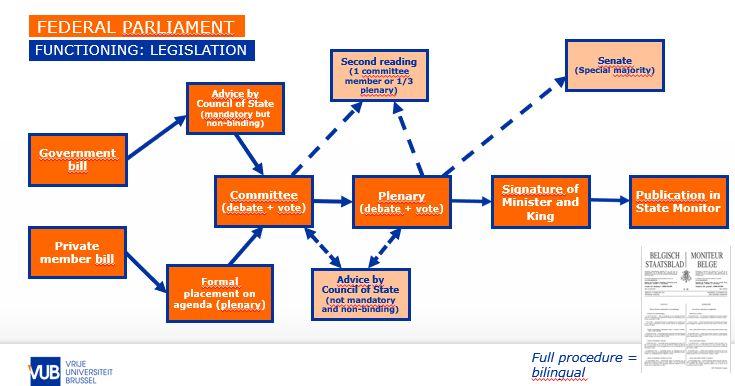class 7 Belgian society and politics
the parliament
role and functions
parliamentary democracy
the theory
parliament is the most important political institution
only directly-elected representative of the people
assigns a government (investiture vote)
holds it accountable (control, vote of no-confidence)
important (1) representative, (2) legislative and (3) oversight tasks

the practice
executives (across Europe) gained power and importance
better equipped
intergovernmental decision-making (EU)
take the lead in law-making
party discipline limits parliamentary autonomy
party-centered electoral rules → MPs dependent for future careers
loyally pass governmental legislation
control/oversight less effective and critical
patitocracy
like in Belgium
parties dominate every stage of policy-making (also in parliament)
undermine parliamentary chain of delegation
concentration of power (party leaderhip)

bicameralism
1831: bicameral parliamentary system
chamber of representatives: lower house
senate: higher house
conservative counterforce
higher electoral tax + minimal age of 40 (instead of 25)
true bicameralism
legislation (vote in chamber + senate)
cabinet oversight
housed together in palace of the nation
1993: reform of bicameral system
introduction of community senators; next to directly-elected and co-opted senators
3 legislative procedures
monocameral in chamber of representatives
bicameral procedure (constitution, special laws)
optional bicameral procedure (evocation right)
limitations on oversight powers
2014: sixth state reform
no more directly elected senators
meeting place of the regions and communities
legislative powers severely limited
monocameral procedure in chamber becomes the norm
exception: institutional reforms
second reading in chamber: possible laws read and checked
practically no more oversight powers
only written questions
composition and internal organization
composition
general trends: more young MPs, higher legislative turnover, electoral quota (more gender equality)
organization
modern parliaments are characterized by
hierarchy: party groups, group leaders
issue specialization: MPs specialize in committees, working groups…
→ 2 central building blocks: party groups and committees
party groups
MPs that unite in parliament to cooperate politically and logistically
usually belong to the same political party
formal recognition: at least 5 members (extra resources, staff, rights)
within party groups: division of labor (specialization)
useful?
necessary instruments of parliamentary business
more efficient decision-making, preference aggregation
but constraints of individual MPs autonomy
party group leaders
each party group is led by a leader
unlike other countries it’s not the party president
still important player in parliament
manager of party group
go-between between MPs and party leader (frequent contacts)
represent party group in parliamentary governing bodies
most important spokesperson
ensure party unity
dissidence (during votes)
rarely occurs (party discipline)
when it does:
symbolic: no impact on outcome
often more experienced MPs
abstention (no vote against party)
prior permission
staff support
MPs have relatively little staff support
→ pooled: often extracted from parliament by parties
ministers have far more staff members
committees
standing committees (also investigation committees, temporary committees)
specialized legislative work
in-depth discussion of bill proposals, amendments, hearings
first vote
important part of oversight activities
oral quesions to ministers
interpellations
composition
17 permanent members (+ substitutes)
proportional representation of aprty groups
plenary meeting
most important meeting
all members
chaired by speaker (member of majority)
most agenda items are prepared in committees
some exceptions: state of teh union, topical debates…
functioning, tasks and instruments

legislation
90% rule
way more accepted government bills
prioritized
implementation of European law
more technical expertise
same at regional level
legislative majorities and special majorities
simple majorities
most laws = simple majority
at least 50% present + 50% of these must support (yes, no or abstention)
follows majority-opposition divide (often also consensus)
no majority in linguistic group = possible
but: alarm bell-procedure
suspension of procedure
¾ of linguistic group
only used twice in history
special majorities
changing the constitution
approval of list of articles open to change (by both chamber and senate 50%)
parliament is automatically dissolved → new elections within 40 days
new parliament: vote (2/3 majority → in both senate and chamber)
special majority laws
organization of federal state
2/3 majority + 50% in each languistic group → in both senate and chamber
controlling the government
written questions
not very influential or critical
obtain information from minister (build a case, represent local concern)
require written answer within 20 days (often more)
oral questions
plenary or committee
more topical character (recent events)
require oral response by minister (+ reaction by MP)
interpellations
most influential control instrument
plenary or committee
minister held accountable for actions, situation or position
concluded with a motion and vote
investigation committees: special committees that investigate wehter government or administration made mistakes (powerful instrument, can summon witnesses)
approval of the budget
important recurrent yearly process
discussion and vote of entire budget for next year (income, expenses)
must be voted before 1st of January (potential adjustments around summer)
problem: often submitted quite late
the regional parliaments
organization and functioning
very similar to federal parliament
organization in committees, party groups, plenary
legislative and control functions
investigation committees
only a constructive vote of no-confidence
party discipline, limited autonomy for MPs + dominant executive
main difference
monocameral
monolingual
no double majority needed (simple majorities and exceptionally 2/3 for institutional reforms)
Brussels: mirror of federal level
all documents/debates in 2 languages (simultaneous translation)
mostly simple majorities → but special majorities for certain issues + alarmbell procedure too
conclusions: does parliament matter
limited political influence
party discipline
MPs dependent from party for re-election (list position)
coalition agreement = Bible
parliament only involved late in the policy-making process
limited staff support compared to ministers + parties
high legislative turnover
complexity + need for rapid decision-making
but tasks go beyond legislation
legitimation: democratic stamp of approval
agenda-setting
oversight
recruitment and training
constituency service
party discipline is not exclusively dysfunctional
more efficient decision-making + political stability
MPs are elected on party lists (based on party program)
MPs can (informally) weigh on policies behind the scenes
a lot of meetings
expertise and specialization is essential